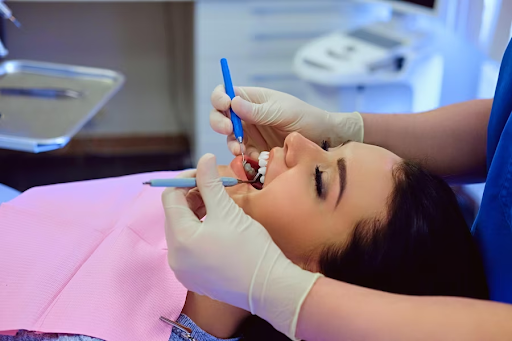Taking care of your oral health is more than just a routine; it’s a journey towards a happy and confident smile. If you’ve ever wondered, “How often do I need to see a dentist?” you’re asking the right questions. Ideally, going to the dentist regularly ensures that your oral health is in its best shape. So, how often should you schedule your dental appointments?
Taking Care of Your Dental Health
Beyond just aesthetics, maintaining good oral health is a cornerstone of overall well-being. A healthy mouth means more than just cavity-free teeth. It’s about preventing potential issues before they turn into major headaches—or, rather, toothaches.
Regular dental appointments are a proactive approach to keeping your oral health in check. It’s like giving your teeth a regular tune-up to ensure they perform at their best. These check-ups play a crucial role in preventing dental problems, detecting issues early on, and saving you from unnecessary pain and expenses down the road.
Importance of Regular Dental Check-ups
For Your Dental Health
Early Detection of Cavities and Gum Disease
Regular dental check-ups play a crucial role in identifying cavities and gum disease at an early stage. These common dental problems often develop silently, causing minimal discomfort. Routine visits to your dentist serve as a proactive measure, acting as a shield to catch these issues in their initial phases and preventing them from escalating into more significant dental concerns.
Preventing Serious Oral Health Issues
Consider your dentist as a preventive guardian for your teeth. Regular check-ups go beyond avoiding cavities; they are your defense against more serious oral health issues. Whether it’s potential tooth infections or the risk of tooth loss, these routine examinations act as your frontline protection. It’s akin to having a reliable dentist who intervenes before any significant dental issues arise, ensuring your oral health remains in top-notch condition.
For Your Overall Health
Oral Health and Systemic Health
Contrary to popular belief, your oral health doesn’t exist in isolation; it intricately ties into your overall well-being. Extensive research has unveiled links between poor oral health and broader systemic issues such as heart disease and diabetes. Regular dental check-ups go beyond mere tooth care; they play a pivotal role in maintaining the harmony of your entire well-being.
Regular Cleanings and Preventing Issues Like Heart Disease
Plaque, a bacterial biofilm on teeth and gums, can cause systemic inflammation, which leads to heart disease. Regular dental cleanings remove bacterial plaque, reducing the risk of dangerous germs entering the bloodstream and causing inflammatory responses, preventing cardiovascular issues linked to poor oral health.
General Guidelines for Dental Visit Frequency
American Dental Association (ADA) Recommendations
The American Dental Association (ADA) recommends dental appointments twice a year as a general rule of thumb. However, you don’t need to consider this a strict law. It’s more like a friendly nudge in the right direction.
Factors Influencing Visit Frequency
- Age: Just like our bodies, dental needs evolve with age. Children may require more frequent visits as their teeth develop, while adults and seniors might find the standard biannual visits sufficient. We’ll unravel the age-specific intricacies, ensuring you’re not overdoing it or missing out on crucial check-ups.
- Existing Dental Conditions: If you have existing conditions like gingivitis or cavities, your dentist might recommend more frequent visits. It’s all about tailoring the frequency to your unique dental battlefield.
- Overall Health Status: Conditions like diabetes can influence your dental needs. Your dentist will be able to recommend how often you need to schedule your appointments based on your overall health.
Special Considerations
- Pregnancy and Dental Visits: During pregnancy, hormonal changes can affect oral health. It’s recommended to continue regular dental appointments and, if possible, schedule treatments during the second trimester. Routine cleanings and addressing dental issues are crucial for maintaining oral health during pregnancy.
- Orthodontic Considerations: If you have braces or other orthodontic appliances, maintaining oral hygiene becomes paramount. Regular dental check-ups help monitor the progress of orthodontic treatment, ensure proper oral health, and address any issues that may arise during the orthodontic journey.
Signs It’s Time to Visit the Dentist ASAP
1. Persistent Pain or Discomfort
Ongoing pain or discomfort in your mouth is a clear signal that it’s time to schedule a visit to the dentist. Whether it’s a dull ache or a sharper sensation, these persistent issues could indicate an underlying problem that needs professional attention. Ignoring such discomfort may lead to more significant and potentially avoidable dental concerns.
2. Swollen or Bleeding Gums
Healthy gums should neither resemble a mini water balloon nor bleed easily. If you notice swelling or bleeding in your gums, it’s a red flag that shouldn’t be ignored. These symptoms may indicate issues such as gum disease or inflammation, and addressing them promptly with a dentist can prevent the progression of more severe oral health problems.
3. Unusual Changes in Oral Health
Any sudden and unusual changes in your oral health demand attention. Increased tooth sensitivity, changes in tooth color, or alterations in the appearance of your gums could be indicative of underlying dental issues. Rather than dismissing these changes, seeking the expertise of a dentist ensures a thorough examination to identify and address potential concerns early on.
4. Don’t Ignore the Signs
Your mouth has a way of communicating when something isn’t right. Ignoring these signs can be risky. Instead of letting potential issues escalate, it’s wise to prioritize a timely visit to the dentist. Addressing concerns promptly not only alleviates discomfort but also helps prevent more extensive and costly dental problems in the future. Taking action at the first signs of trouble is a proactive approach to maintaining optimal oral health.
Personal Oral Care Practices
Ensuring optimal oral health begins at home with a dedicated daily oral care routine. A proactive approach to at-home oral care lays the foundation for a healthier smile, reducing the likelihood of more extensive dental interventions during regular check-ups.
Daily Oral Hygiene Routine
- Brushing Techniques and Frequency: Brush teeth twice a day using fluoride toothpaste. Use a soft-bristled brush and gentle, circular motions to clean teeth and gums effectively.
- Importance of Flossing: Flossing is essential to remove plaque between teeth and along the gumline. It helps prevent cavities and gum disease, promoting overall oral health.
Choosing the Right Dental Care Products:
- Toothpaste and Mouthwash Recommendations: Select a fluoride toothpaste to strengthen enamel and prevent cavities. Mouthwash with fluoride can provide additional protection against bacteria and bad breath.
- Importance of Fluoride: Fluoride is a key ingredient in dental care products, helping to remineralize enamel and prevent tooth decay. It plays a vital role in maintaining optimal oral health.
Transform Your Smile with Confidence—Trust South Florida Dental Center
Entrust your oral health care to the South Florida Dental Center in Coral Springs. Our modern dental office, equipped with advanced diagnostic tools and cutting-edge technology, is dedicated to providing high-quality, comprehensive dental care.
From routine dental appointments to specialized services such as root canals, dental implants, and cosmetic dentistry, we’ve got you covered. Experience the difference with our comfortable office environment, state-of-the-art equipment, including a 3D CAT scan and digital X-rays, and friendly staff committed to making your dental visit exceptional.
Trust Dr. Daniel Cohen for your regular dental care needs and embrace a healthier, more confident smile. Schedule your appointment today.



